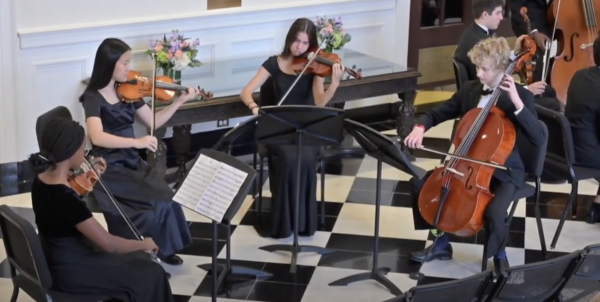Land of Fire’s Impact On the Westminster Community and Beyond
One of the many things that attract parents and students to Westminster is our school’s involvement in the community outside of the front and back gate. From community service groups to JanTerm field trips, students spend a good amount of time off-campus representing Westminster. As for our teachers, they not only volunteer to chaperone our various excursions, but also contribute to the Atlanta community in their own ways. Particularly, Mario Chard, an Upper School English teacher, recently released a collection of poems titled Land of Fire. Chard’s first book has not only been discussed frequently by Westminster students, but has also received high praise from a large number of internet reviewers.
Publishers Weekly wrote that “Chard displays deep interest in sonics and wordplay while dissecting language in this debut of irresistible tension.” Alongside many stellar reviews, Land of Fire was named a 2018 Notable Debut by the Poets and Writers Magazine. Almost a year after the publication of his first book, Chard reflected on the process of writing and publishing Land of Fire in a recent interview.
Chard started with discussing the inspiration for the title of his collection, “The book didn’t start out as a book…but as a bunch of individual poems.” He went on to elaborate on the common themes of immigration that he noticed in his poems overtime, and how a trip to Ushuaia, Argentina, the Southernmost city in the word, sparked an idea in his head, “In Tierra del Fuego (Land of Fire in Spanish)…a lot of pieces came together.” Being on what some consider to be the “edge of the world,” Chard observed that “borders are something that…aren’t there when we get there, we create them ourselves.” This concept largely influenced the poems featured in Land of Fire not only in a geographical sense, but also in a social and psychological sense.
Kerrick McDonald, one of Chard’s many sophomore students, praised Chard for his alternative yet interesting approach to the very first class of the year, “I remember we just looked at and analyzed maps for the entire class, which was clearly one of his interests. This was the first time that Mr. Chard’s class really stood out to me, because we went beyond the simple subject of English.”
Chard went on to mention his personal favorite poems, one in particular named “Cavaierjo.” He personally felt as if the poem spoke to the overall themes of the book and also felt a deeper connection to the poem as he wrote it in the true location in which the poem takes place. “The poem was about the death of eight travelers in the desert…and I wrote the poem in the cemetery in which one of the eight people was buried,” said Chard. He added that the tombstone did not have a name engraved into it, which “contributed to (his) experience greatly. It made it feel like I was experiencing the poem as I was writing it and in a whole other way than I ever had before.”
Chard also mentioned the poem “As Saint Mark Says They Mustn’t” as his other favorite. Being the longest titled poem in the collection, this poem stands out on its own, but what Chard says he particularly loves about the poem is its mystery, “I actually don’t like to talk about this poem too much because there is so much that I want the reader to uncover. I want them to have the same feeling reading the poem that I did writing the poem.” Although Chard explained that he loves all of his poems, he feels special, personal connections with these specific poems that make them stand out.
From start to finish, Land of Fire took an astonishing 10 years to be published. When asked to describe the publication process, Chard started off with a remark about the difference between a fiction book process and a poetry book process, “because poetry books don’t sell as well as fiction books, they are published in a completely different way.”
In Chard’s case, Land of Fire won a contest, and went through Tupelo Press. “This was an independent press, one that wasn’t considered one of the main five press publishers, so they have to do all the work themselves,” said Chard.
He then mentioned the designer that helped with the art for the covers of the collection, “I had never thought about having a cover to my book, so it was interesting to figure out the design of my book and the image that I wanted readers to take away from it on the cover,” said Chard. After some proofing and copyrighting, the book was sent out for review and eventually published in March 2018.
Chard particularly found the review process exciting. “[I] finally felt a sense of achievement on this project that I had been working on for 10 years,” said Chard, “and it was interesting to see other people reviewing and putting time into not only reading my work, but writing about it.”
Chard finished by offering an invitation to any student writers who want guidance or need help with their work, “At my high school, I didn’t have anybody to go to with my poems, and I want to change that for poets at this school.” Although Chard explicitly said that Land of Fire has no impact on his teaching style and that he “can’t make poets out of everybody,” he expresses interest in those who are poets and gladly welcomes those with questions.
Another one of Chard’s students, Max Norman, expanded on Chard’s concept that one cannot make poets out of everybody and commended Chard for his “ability to structure the class so that any type of person can enjoy it and invest time into it.” Norman went on to praise the few poems that he had seen from Land of Fire. Norman’s acclaim has been echoed by many other students and members of the Westminster community, and Land of Fire is another fine example of Westminster’s outside world involvement and success.



